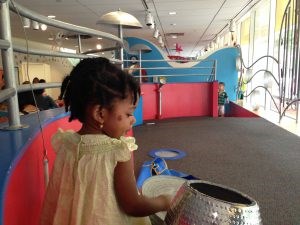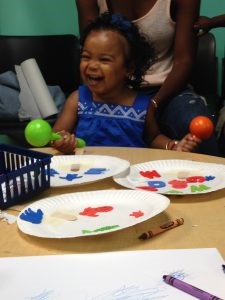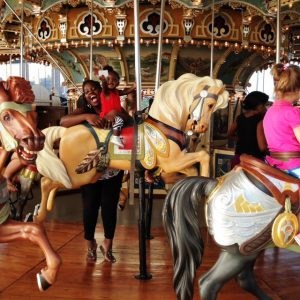By Robin Smith

Brain science has proven that there is real power in play for children. Play is often dismissed as "just fun." However, it is through play that children, starting at birth, learn about and interact with their world and gain the cognitive, physical, and social skills necessary to succeed in school and their adult lives. According to Professor Karen Hutchinson of Rowan University, "Play is actually the work of a child in which they are preparing themselves for adult roles and for society at large."
For a child, play is a means for exploring and learning, developing new skills, and connecting with others. Through self-directed play, children follow their interests, explore the unknown, learn to link choices with outcomes, challenge themselves, and navigate friendships.
Play is important in developing key skills that serve as a foundation for life-long success, including focus, self-control, working memory, critical thinking, communication, problem solving, and collaboration. These are known as executive function skills that build on core brain processes. Executive function skills complement knowledge of core subject matter (such as language arts, math, science, and history) and are critically needed in a world that is becoming increasingly complex, competitive, and interconnected.
Researchers and educators recognize that these skills are an even better predictor of a child's success than IQ. "Play is often perceived as immature behavior that doesn't achieve anything," says David Whitebread, a psychologist at Cambridge University who has studied the topic for decades. "But it's essential to their development. They need to learn to persevere, to control attention, to control emotions. Kids learn these things through playing."
At Excellence Baby Academy, the importance of play is woven throughout the parenting education curriculum which covers all aspects of child development. This is supplemented by weekly toy-making instruction during which parents learn how to make toys and books and how to use these toys and books to support every stage of their children's young lives. We also make sure to provide many opportunities for the parents to observe their children in the child development room as well as during our family meals, home visits, and outings.

We often extend the classroom into the community to enable parents to apply what they are learning in the parenting education and toy making classes while exposing them to the richness of the resources in their neighborhoods. Since museums are hot spots for learning and provide an excellent forum in which to promote the development of executive function skills, we take our families to the Brooklyn Children's Museum (BCM), among others museums, cultural institutions, zoos, parks, and libraries. As with all of these places, families can participate in exploration and play-based learning at BCM.
The museum offers babies a safe space within which to explore so they can learn about their relationships to, and their effects on, the world. There is a designated area for families with children from birth to five-years old which is specially designed to engage and stimulate the five senses through which children first learn. "Playing with your baby begins by engaging all of his senses.
His eyes, ears, nose, hands, and mouth are his learning tools. As he grows, he learns to use his body to make discoveries." (Zero to Three "The Power of Play," 2004). At the museum, babies are able to experience different textures and sensations in the water and sand play areas, where pinwheels, scoopers, and funnels enable them to test their impact on the materials. They can experiment with drums, cymbals, and different noise-making objects that allow children to create a variety of sounds and gain important memory, language, and listening skills.

Appropriate developmental skills and knowledge are embedded in the materials available at the museum, and they are presented in an open-ended way which motivates children to explore them.
This kind of exploratory play nurtures children's natural curiosities and abilities to be creative, inventive, collaborative, and resourceful as well as other critical executive function skills. Admission to the Brooklyn Children's Museum is free on Thursdays from 2 — 6 PM. You can get more information by visiting visit their website at https://www.brooklynkids.org/visit/ or calling (718) 735-4400.
There are many other free places were parents can go with their children to learn, grow, and enjoy, including local farmers' markets, playgrounds, parks, and libraries. For more information about the importance of play and suggested activities to do with your children in or out of your home, go to https://main.zerotothree.org/site/DocServer/ThePowerofPlay.pdf.



